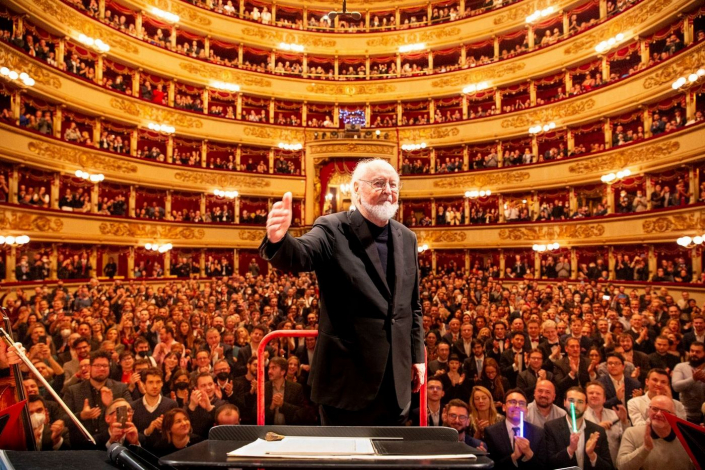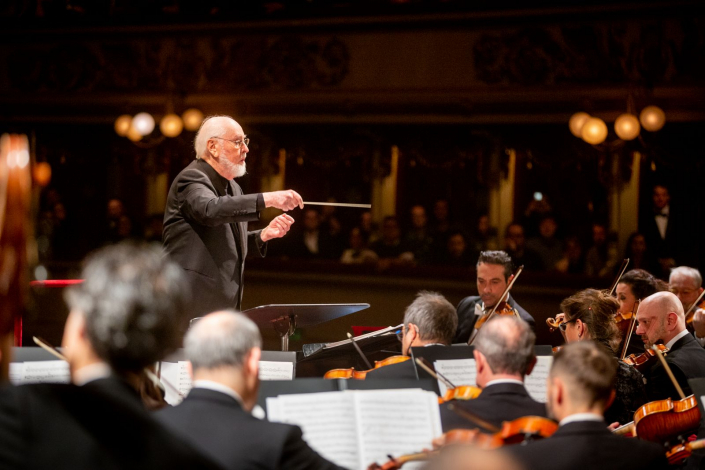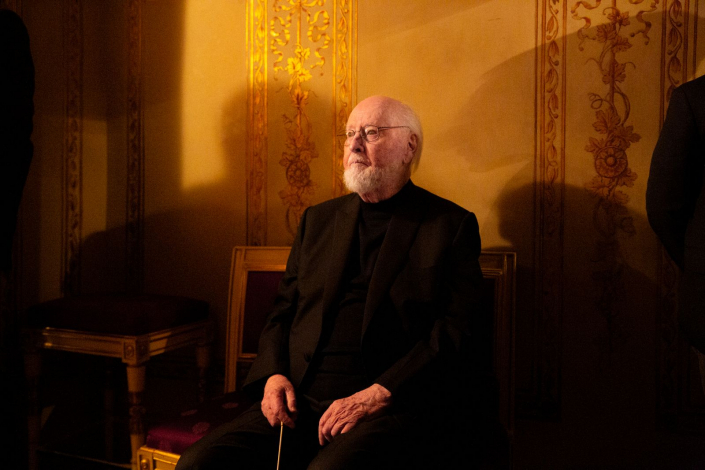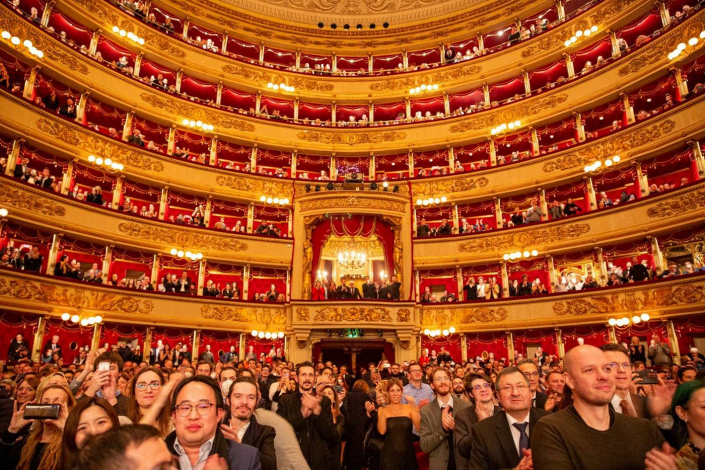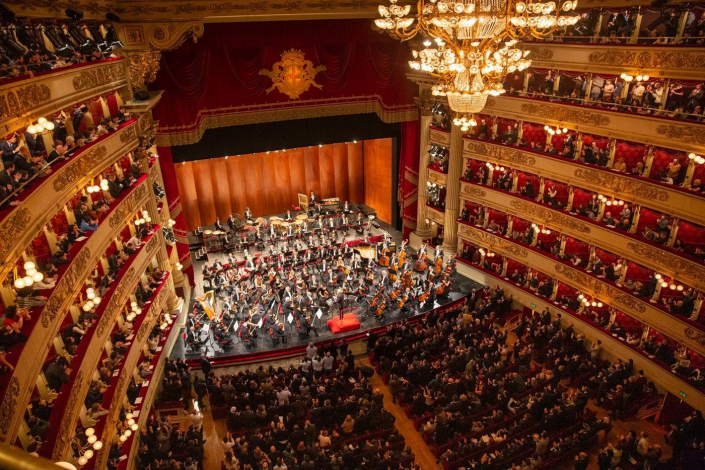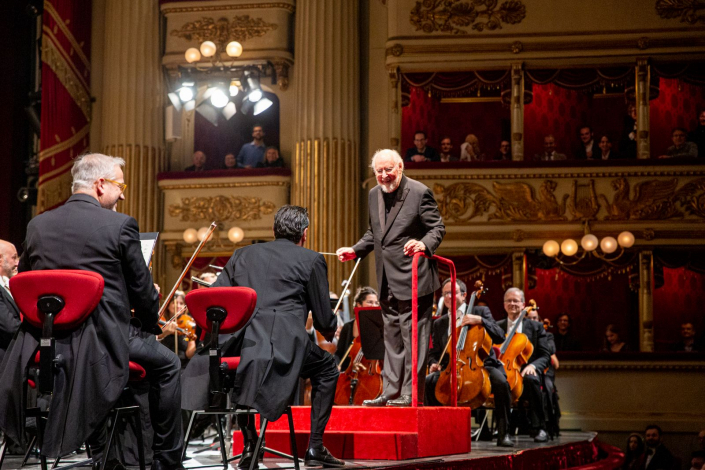John Williams – Milan 2022 – Concert Summary
On Monday, December 12, 2022 the Teatro alla Scala in Milan, Italy hosted a historic concert where John Williams conducted the orchestra Filarmonica della Scala in a program entirely dedicated to his film music.
A good part of the SoundTrackFest team attended the concert and Coque Cano Arañó leaves us a great detailed summary of it.
BREATHTAKING JOHN WILLIAMS
As we are at the gates of the World Cup final, I will begin this article with a soccer simile: John Williams achieved last Monday, December 12, 2022, his particular “hat trick” of concerts in the most historic places of classical music in Europe and with the most prestigious orchestras of the old continent.
It is true that along the way we lost the chance to see him at the Royal Albert Hall with his beloved London Symphony Orchestra on October 26, 2018 (read more), but unexpectedly and after a health problem upon his arrival in London that also forced to cancel the concert scheduled in Vienna for the following week (read more), when we already feared that this would be the last attempt on his part to return to Europe after 20 years of waiting, has surprised us all with a vitality unbefitting his age, treating us to four absolutely historic events in temples such as the Musikverein in Vienna (with a first double concert on January 18-19, 2020 (read more) and a second appearance on March 12-13, 2022 (read more)), the Concert Hall in Berlin (there was a triple concert between October 14 and 16, 2021 (read more)), and now the unique concert at La Scala in Milan, the subject of this article.
Four essential opportunities to see the maestro in front of such prestigious ensembles as the Vienna, Berlin and Della Scala Philharmonics. What for Williams himself has undoubtedly been a historic recognition of his music, has become for the fans an immense gift that will remain engraved in our memories forever.
In view of this second youth past the age of 90, we no longer dare to predict that Monday’s concert may have been his last in Europe. But if it were, it would undoubtedly remain as a golden brooch, with the impressive Teatro alla Scala surrendered to his talent, to the magic of his music, as Vienna and Berlin surrendered before.
The bicycles flew again, the wands worked their magic once more, the whip of adventure whistled more than ever, and of course the laser swords buzzed again (even literally, because unlike previous concerts, in Milan there were some fans showing their colored sabers, as a tribute, and as usual in the master’s concerts at the Hollywood Bowl).
Williams displayed his inexhaustible arsenal of greatest hits, albeit with some slight differences from the Vienna and Berlin programs. Not many, it must also be said, and that is something that although it is difficult to change when we have such a large number of iconic themes, the truth is that it would be fantastic to open his programs to other works that are less popular, but equally wonderful, and that would deserve to be included in his concerts.
The “sold out” in less than three minutes after tickets went on sale was already an indication that this legendary stage would be dedicated for the first time in its history to film music, represented by its greatest exponent, by a composer who has managed to show the world the enormous value that this music has always had, something that masters such as Rozsa, Bernstein, Herrmann or Goldsmith, to name a few, would undoubtedly have deserved before.
The concert opened in the same way as the first one in Vienna, with the spectacular “The flight to Neverland” from Steven Spielberg’s 1991 film “Hook”. Although the fantastic Filarmonica della Scala demonstrated its great class, it started a little cold with a theme that required virtuosity and strength in equal parts and was less energetic than expected. It did not take long to pick up the tone, especially in a memorable second part of the concert. From my point of view, it was clearly from less to more.
The second piece was a suite from “Far and away”, a score from 1992 in which the maestro assimilated Celtic roots into his repertoire. A wonderful work that Williams is regularly including in his concerts (it was performed in Vienna, with the theme “Donnybrook fair” and the violin soloist Anne Sophie Mutter, and was repeated in Berlin with the Suite that concerns us). It is clear that it is a work especially dear to the maestro, who does not hesitate to consider it essential despite not being one of his scores with the greatest popular impact. Radiant interpretation of the orchestra with special mention for the strings, oboe, and flute.
Curiously, the audience also started somewhat cold, with applause of course, but without the boasts that were experienced at the Musikverein and the Concert Hall in Berlin from the beginning. It didn’t take long for the audience to react, as Harry Potter immediately arrived to enchant the evening.
Of the three programmed pieces of the saga, the first (the famous “Hedwig’s theme”) and the third (the final coda of “Harry’s wondrous world”), are usually untouchable in European concerts, not so the beautiful “Fawkes the Phoenix” belonging to the second part “Harry Potter and the chamber of secrets”. This is where we begin to see that Williams prepared for the occasion a program with many pieces of rapturous melodic force, not as adventurous as in previous concerts (although they were also, of course). Perhaps he thought, and if he did it was very wise, that the operatic Teatro alla Scala and the orchestra founded by Claudio Abbado deserved this unbridled approach, with great prominence of the string section, another of the house’s specialties.
Although three pieces from the saga of the little magician absorbed perhaps too much time of the program, the truth is that it was a turning point and from then on, the concert only increased in atmosphere, with enthusiastic applause and repeated ovations from a devoted audience.
The emotion had come to stay and then we witnessed a sublime interpretation (even more languid than usual) of the timeless main theme of “Schindler’s list”. The orchestra’s violin soloist, Francesco De Angelis, virtuoso and delicate, left an overwhelmed audience with their hearts in their fists. A great version of one of John Williams’ masterpieces.
Before the intermission, it was the turn of what, for many, is the maestro’s greatest score in his career, “E.T. the extraterrestrial”, Spielberg’s classic in which the director decided to edit the entire final scene of the film to adapt it to Williams’ music and not the other way around as usual, given how impressed he was with the theme composed. This theme is precisely the one that was performed in concert, entitled “Adventures on earth”. A long piece that summarizes the composer’s art: magic, adventure, and above all emotion, with his innate gift for melody and narrative. The orchestra did not fail and closed this first part in style.
Williams’ vitality was beyond any doubt, demonstrating that he has not lost his personal and subtle conducting style, and that the evident growth of the concert during this initial part of the program was going to be continued in a second part that turned out to be magnificent. The intermission came and with it a brief, but well-deserved break in which the fans could meet again in the hall of the historic venue, with unexpected surprises such as meeting and chatting with music figures such as Pino Donaggio or Anne Sophie Mutter.
As I advanced, the second part of the concert flew higher, starting with two themes of the masterful score that the composer wrote for “Superman”, a work that seemed to be left behind in his concerts, so well that the main theme was interpreted in the Berlin concert after disappearing from the Vienna program. First we heard precisely the quintessential superheroic march “Superman march”, which lacked a little strength in the brass but was still impressive.
And I stop here to make a purely personal comment that I try to avoid in these chronicles, but on this occasion I cannot avoid because the next piece performed; the “Love theme” dedicated to the romantic relationship of the main character with Lois Lane, is my favorite love theme in the history of cinema. Hearing it in concert was one of the most magical moments of the night. Once again the string section boosted the sensitivity in an immaculate interpretation.
And from the most famous superhero in the comics to the most famous hero of the cinema. From Superman to Indiana Jones, without leaving the adventure or romance, in another saga where you can enjoy Williams’ symphonism, his source of talent in the scenes of action and adventure, his comic licenses and his ability to create memorable themes. The maestro is aware that for the mythical archaeologist he has composed a large number of pieces with concert versions that he has been polishing over the years (such as Marion’s theme, whose recent extended version was performed in Vienna), so he usually incorporates more than one in each program. And this one was no different, as up to three themes were performed.
The first was the “Scherzo for motorcycle and orchestra” from the third title of the saga “Indiana Jones and the Last Crusade”, again in its current elongated version, a devilish tour de force that makes the orchestra multiply its efforts. It is a motif of action and comedy with an almost impossible but non-negotiable tempo for Williams. Of course, an orchestra like the Filarmónica Della Scala did not disappoint.
The second theme was the big scoop of the night, European premiere, as it corresponded to the fifth and last Indy adventure, whose title “Indiana Jones and the dial of destiny” has been announced this December (hence the aseptic “Indiana Jones 5” in the booklet). And it is a prodigious theme. Again it is a piece of great romanticism, extremely (and we would say anachronistically) classical and even demodé, with echoes of the great masters of the Golden Age, and an undeniable kinship with certain parts of Marion’s theme. Christmas came early with this gift from the composer, which presages a great musical finale in what will be not only his last score for the saga but, it seems, also that of his unfading film career.
The inevitable “Raiders march” put the finishing touch to this part dedicated to Dr. Jones. Undoubtedly one of the always awaited moments in all his concerts, which gets the pulses of all attendees up.
The final part of the concert had the “Star Wars” saga as the only protagonist, both in the last two pieces of the program, as well as in the two courtesy encores. No less than four themes that usually come and go in all his concerts: in the official part the “Princess Leia’s theme” and the “Throne room & finale” (both from the first title of the saga) were programmed, and in the encores appeared “Yoda’s theme” and “Imperial march” (both from the second movie entitled “The Empire strikes back”).
Galactic finale that once again demonstrated the two-headed side of the concert, with an important part of pieces of marked melodic character, mostly romantic, such as the themes of Leia and Yoda, and another part with the strength and spectacularity of the elgarian theme of the throne room that links with the final credits and therefore with the main theme of Star Wars, and of course the imperial march that, whether or not in the program, we know that it will end up closing the concert.
Although Williams usually repeats the same anecdotes and his amusing way of saying goodbye to the audience by making the gesture of going to sleep, the truth is that he did not seem dull or tired at any time, quite the contrary. One would say that these concerts revitalize him, as if they added years of life to him to be in front of the orchestras he has always admired and in the musical temples where he always dreamed of listening to his music. As it seems to recharge his batteries to be in front of a European public that idolizes him and will undoubtedly be grateful for any other visit he is still ready to give us.
If Milan was the last stop on this exciting journey, it was a breathtaking one.
Article by Coque Cano Arañó
Pictures by Gorka Oteiza, Coque Cano, Pedro Prados, Marc Timón
Pictures by SoundTrackFest
Pictures by Filarmonica della Scala













